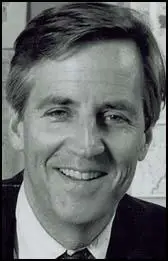Evan Thomas

Evan Thomas was born in Cold Spring Harbor, New York, the son of publisher Evan Thomas II, and the grandson of Norman Thomas.
Thomas became a journalist. He worked for Time Magazine before joining Newsweek as Washington Bureau Chief. In 1986 Thomas was the co-author of The Wise Men: Six Friends and the World They Made, a book about about the U.S. foreign policy establishment: Dean Acheson, Chip Bohlen, William Averell Harriman, George Kennan, Robert Lovett, John McCloy.
This was followed by The Man to See (1991) and The Very Best Men: Four Who Dared: The Early Years of the C.I.A. (1995), a book about the careers of Frank Wisner, Richard Bissell, Tracy Barnes and Desmond FitzGerald.
Other books by Thomas include Back from the Dead: How Clinton Survived the Republican Revolution (1997) and Robert Kennedy: His Life (2000).
Primary Sources
(1) Evan Thomas, The Very Best Men: The Early Years of the CIA (1995)
The Cubans were notoriously leaky, while Castro's security service, the DGI, had been well trained by the East Germans, who had a knack for working double agents."
Shortly before FitzGerald was due to leave for Paris to meet AMLASH, Sam Halpern walked in on a shouting match between his boss and the SAS counterintelligence (CI) officer. "The CI man was telling Des not to go to Paris. He felt Cubela was a dangle, or that he'd talk to his friends. It was a real collision. The CI man wouldn't give and Des wouldn't give." FitzGerald decided to go anyway.
In Miami, Ted Shackley was equally frustrated. "I told Des that it was something he shouldn't do. 'If AMLASH does do something,' I told him, 'it's quite likely they'll track you down. You have a high profile. What are you going to get out of this? The only thing you'll get is the satisfaction of saying you saw the guy!' " said Shackley. "Des shrugged and went on his merry way."
FitzGerald's boss, Richard Helms, "shared the qualms (of the SAS staff)." As the head of the clandestine service, he could have vetoed the trip. "But," Helms later explained, "I was also getting my ass beaten. You should have enjoyed the experience of Bobby Kennedy rampant on your back." Helms signed off on FitzGerald's meeting with Cubela. Although FitzGerald was going in Robert Kennedy's name, Richard Helms decided it was "unnecessary" to tell the attorney general, whom he regarded as an even greater risk-taker than FitzGerald. "Bobby wouldn't have backed away," said Helms. "He probably would have gone himself." It shows the level of pressure felt by the CIA that Helms, normally careful to cover his back, didn't even bother to get Kennedy's authorization.
(2) Evan Thomas, The Very Best Men: The Early Days of the CIA (1995)
Wisner was obviously too sick to go to Spain. He was so depressed that his wife, Polly, worried that he would try to commit suicide. On October 28, before he drove out to his farm on the Eastern Shore of Maryland, she called the caretaker and asked him to remove the guns from the house. Wisner found one of his boys' shotguns and killed himself on October 29, 1965.
Wisner's death saddened but did not shock his colleagues. "I got a cable in Kuala Lumpur, where I was stationed," said Arthur Jacobs, the "Ozzard of Wiz" who had been Wisner's aide in the early 1950s. "The cable was from Des FitzGerald. It said that Frank had died and gave no reason, but I knew." Wisner's suicide was "entirely rational, if you can say such a thing," said his niece Jean Lindsey. "He realized that his life would be circumscribed by increasing cycles of depression. I saw Frank three days before he died and he seemed in good spirits. He talked about his children. Perhaps he had made up his mind to kill himself.
At his funeral the Bethlehem Chapel in the National Cathedral was overflowing with old friends who sang "Fling Out the Banner" as Wisner's family marched down the aisle at the end of the service. "Instead of a dirge, it was exuberant, powerful, exultant," recalled Tom Braden. At Arlington Cemetery, Frank Wisner was buried as a naval commander, his wartime rank. All the top officials of the agency, from director on down, were in attendance. (The CIA posted guards to keep the KGB from seeing who was there.)
Henry Breck, a junior CIA officer out of Groton and Harvard, watched his grim-faced elders as they mourned. They were defiant and proud, but besieged. The CIA was feeling particularly embattled that October. A month earlier word had spread through the agency that the New York Times was embarking on a first-ever investigation of the CIA.
